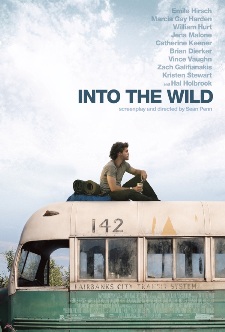Published on October 29, 2007
in movies.
If you need reasons to go see this movie, here are four that quickly come to mind:
- Because it was written and directed by Tony Gilroy, the guy who wrote the screenplays for the Bourne movies. It’s as fast-paced and suspenseful as those are, but not a single round is fired.
- Because Tom Wilkinson, who plays a manic-depressive trial lawyer with a newfound conscience, will surely get the Oscar for best supporting actor. (You heard it on Three Roads first!)
- Because Tilda Swinton is far more cold and ruthless as the executive of a polluting agribusiness than she was as the White Witch.
- Because George Clooney “gives a beautiful, modulated performance, and he’s never been more likable,” says New Yorker critic David Denby.
Published on October 26, 2007
in politics.
Which candidate for president said these words recently?
Slate: You talk about the need for arts education in school. Why? And how have you benefited from being a musician?
?????: The discipline that one learns from it is important, but also the stimulation and creativity. If an education system is only left-brain and it does not properly stimulate the right brain, then it’s no small wonder why students are bored to the point of quitting. We lose 6,000 kids a day to drop-out. A third of students in our public schools will drop out of school. It’s not because these kids are dumb. They are bored. What music and the arts do is make sure that those who are right-brain oriented have their lives touched as much as kids who are logic-centered. It’s our creativity that becomes our cultural vehicle and gives us continuity between one generation and the next. Without that continuity, we not only lose some songs or artwork, we lose our capacity to transmit our culture.
Click here to get the answer, or just continue reading and it will become clear….
Mike Huckabee stands no chance of winning my vote, but he has certainly won my respect. He’s a politician who’s both incredibly conservative and, dare I say it, compassionate. He has conservative views, but you can clearly see that they’re the result of genuine thought, not some Rovian calculation. And he doesn’t vilify people with different points of view or seek to impose his conservative creed on the entire population.
Continue reading ‘Quiz’
Published on October 24, 2007
in politics.
I’m sorry, I meant Mahmoud Ahmadinejad. Silly me. Well, can you really blame a guy for getting them confused? Their names are pretty similar.
It’s a new spin on the ‘elect Democrats and the terrorists win’ canard. Now it’s ‘elect Barack Obama and you’re actually electing the leader of al Qaeda.’
If you have no idea what I’m talking about, I’m referring to Mitt Romney’s difficulty in distinguishing Osama bin Laden from Barack Obama. Here’s the transcript of a recent speech, courtesy of the Caucus Blog:
“I think that is a position which is not consistent with the fact,” Mr. Romney said. “Actually, just look at what Osam — uh — Barack Obama, said just yesterday. Barack Obama calling on radicals, jihadists of all different types, to come together in Iraq. That is the battlefield. That is the central place, he said. Come join us under one banner.”
Yes, the names do have similar assonance, but if you think for a second that it was real mistake, you don’t quite understand the depths that Mitt Romney is willing to troll in his quest for the presidency.
First off, Republicans have already been messing with Obama’s name. Remember the flack he got for having the middle name Hussein?
The only difference here is that Mitt is so shamlessly—so clumsily—trying to tar Obama for having a Muslim-sounding name. Mitt thinks this will go down well with the xenophobes whose votes he needs to win the primary.
But Mitt’s going to have to do better than that–for example, next time he needs to make sure he doesn’t start off by saying the right name: “Actually, just look at what Osam — uh — Barack Obama, said just yesterday.”
Dilbert creator Scott Adams likes saying the words “monkey god” over and over, because “for some wonderful reason, that combination of words – monkey god – releases a little snort of serotonin directly into the part of my brain that likes it the most.”
For me (and at least one or two other people) the words Jean-Claude Van Damme produce a similar effect. It’s hard to say why this is so. If you have any clues as to why the name of a short Belgian martial artist/actor would be so intrinsically funny, let me know.
As it happens, there is a new movie on the way that will star Jean-Claude as Jean-Claude. It’s called JCVD in JCVD. It sounds like a documentary but it isn’t. It’s a biopic that will star the actual subject.
Leave it to Jean-Claude to break with convention and create an entirely new film genre—the auto-biopic. I’m sure that my blogging comrade Visionary Larry saw this coming.
Suggested reading:
Happy Belated Birthday, Jean-Claude Van Damme!
Published on October 19, 2007
in movies.
 There’s a scene in Into the Wild in which the 24-year-old Christopher McCandless pithily lays out the philosophy that drives him to shun human contact and light out for the Alaskan wilderness.
There’s a scene in Into the Wild in which the 24-year-old Christopher McCandless pithily lays out the philosophy that drives him to shun human contact and light out for the Alaskan wilderness.
Before McCandless, played quite well by Emile Hirsh, delivers his raison d’etre, he acknowledges that he’s “paraphrasing” Thoreau: “Rather than love, than money, than faith, than fame, than fairness … give me truth.”
Whether you think McCandless is a purely heroic character or a tragically misguided one rests on your interpretation of this quote and whether you agree with its priorities.
Is the quest for truth more important than the quest for love? And are they incompatible?
The heartbreaking aspect of “Into the Wild” is how McCandless effortlessly engenders love in other people and then subsequently leaves them behind without hesitation.
Throughout his two-year sojourn that zigzags the American west and ends in Alaska, he continually meets people who plead with him to stick around, but his desire for truth—something that he’s convinced can’t be found in a materialistic culture—keeps sending him back to his solitary existence.
It’s ironic that McCandless’ guiding principle—the one that spurs him to abandon his family and friends in the name of pursuing truth—should come from Thoreau, who, even while living on Walden Pond, went into town regularly for human contact.
 Commas freak me out. Half of the time I worry I’m using too many of them in the wrong places, and the other half I worry that I’m not using enough of the little buggers.
Commas freak me out. Half of the time I worry I’m using too many of them in the wrong places, and the other half I worry that I’m not using enough of the little buggers.
Maybe you can sympathize. Then again, maybe you’re a comma king or queen. Maybe you could care less if you use them correctly or not. That’s a healthy attitude–unless you’re in the publishing industry, and in that case your carefree attitude will get you into trouble, as it no doubt did the person in charge of editing Bill Cosby’s new book, which is entitled, if we’re to believe the cover, “Come On People.”
Graphic design, in lots of cases, obviates the need for certain punctuation and capitalization. And there are a lot of headline writing conventions that break rules. This is not one of those cases, however, where commas don’t matter. They matter big time in this case.
“Bill Cosby is either one kinky bastard or a guy who never learned about the comma of direct address,” Bill Walsh, a Washington Post editor, wrote on his blog (Blogslot) recently. Even if the meaning is clear—we know Bill Cosby isn’t into that kind of thing—it’s embarrassing for the writer, editor and publisher.
I bet editors everywhere will have a good laugh over this. But it will also terrify them, because everyone, regardless of his or her comma command, will occasionally screw the pooch.
Hat tip: Blogslot, the very best blog about editing in the entire sphere-o-blogging.
I am an occasional user of Jott.com, a free service that allows you to phone a message (which is then magically transcribed) to an e-mail address. It’s a handy way to send reminders to yourself. You call up a number and a recording asks “Who do you want to Jott?” You give it a name or say “myself” and then there is a beep and you state your message, which is then transcribed and sent to the recipient’s e-mail address. Pretty neat.
Today, I got an e-mail from Jott about a new program called Jott the Vote, wherein you can phone-email a message to any presidential candidate.
You could send a message to, say, Rudy Giuliani: “Hey, Uncle Rudy, why don’t you tell us about 9/11 one more time.”
Much has been written about how the internet is changing our politics, perhaps even making it more democratic. Where does Jott the Vote fit into this concept?
Is a Jott to a presidential candidate worth anything? I’d like to explore this further, but I gotta go. Maybe later.

